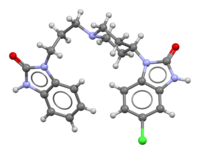
Photo from wikipedia
Background Gastroparesis is characterized by delayed gastric emptying in the absence of mechanical obstruction. Owing to the potential for serious side effects, current treatments have restrictions on their use and… Click to show full abstract
Background Gastroparesis is characterized by delayed gastric emptying in the absence of mechanical obstruction. Owing to the potential for serious side effects, current treatments have restrictions on their use and there is a need for novel compounds with favorable safety profiles. Trazpiroben (previously TAK-906) is a peripherally selective dopamine D2/D3 receptor antagonist being developed to treat chronic gastroparesis. Effects of trazpiroben on the central nervous system and pulmonary system in rats and on the cardiovascular system in dogs were assessed. Methods Functional observational battery and locomotion assessments were conducted in groups of eight female rats receiving 0 (control), 100, 300, or 1000 mg/kg/day oral trazpiroben for 2 days. Assessments were performed at baseline (pre-dosing) and 0.5 hours post-dose on day 2 of dosing. Pulmonary safety: following administration of the same trazpiroben doses, groups of eight male rats underwent heads-out plethysmography at baseline, through 6 hours post-dose, and approximately 24 hours post-dose on day 1. Four telemetry-instrumented male beagle dogs received 0 (control), 1, 10, or 30 mg/kg of oral trazpiroben in a Latin square crossover design on days 1, 4, 8, and 11. Relevant parameters were continuously measured for approximately 18 hours post-dose. Results No clinically meaningful effects on central nervous system, pulmonary, or cardiovascular assessments were observed at any trazpiroben dose. Significantly decreased locomotion occurred with increasing dose, including reduced horizontal/vertical ambulation at ≥ 300 mg/kg/day. Small transient decreases in systolic and pulse pressure at ≥10 mg/kg/day were observed, with compensatory increases in heart rate at 30 mg/kg/day. No trazpiroben-related effects on cardiovascular parameters (including QT interval corrected for heart rate) or body temperature were noted. No trazpiroben-related qualitative electrocardiogram abnormalities were observed. Discussion Our results suggest that trazpiroben has limited central nervous system effects and a favorable cardiac safety profile.
Journal Title: Journal of Experimental Pharmacology
Year Published: 2022
Link to full text (if available)
Share on Social Media: Sign Up to like & get
recommendations!